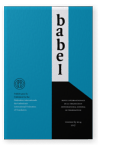Article published In:
BabelVol. 63:4 (2017) ► pp.486–505
Impact of mother culture on the process of translating culture-specific idioms
This study endeavors to explore the problems that Translation trainees’ mother culture poses when translating culture-specific idioms. The study used a translation task that comprises 20 culture-specific English idioms which incorporate lexical entities that can have negative connotations in the Arabic culture. The task was distributed to 40 randomly selected translation trainees, senior undergraduate translation students at the Department of Arabic and Translation, College of Languages, Sana’a University. Findings of the study show that the trainees’ mother culture had a considerable impact on the translation process. This impact exhibited itself in many forms, the most prominent of which is the tendency to offer a culturally-driven judgment of the content of the idiom instead of translating the idiom itself. The paper delineates the various forms of cultural interference as seen in the trainees’ renditions of the idioms in the study.
Article outline
- 1.Introduction
- 1.1Objectives of the study
- 2.Review of relevant literature
- 3.Methodology
- 3.1Data collection
- 3.2Subjects
- 4.Discussion of the findings
- 4.1Strategies
- 4.2Impact of the trainees’ culture
- 4.3Negative influence of the TL culture offering the translator’s assessment of the content of the idiom
- 4.4Proposing two different translations
- 4.5Appropriate responses with cultural implication
- 4.6Negative SL idioms are made more negative in the TL
- 4.7Positive SL idioms receive negative meaning in TL
- 4.8Negative SL lexical items made positive
- 4.9Omitting the negative lexical item from the translation
- 4.10Impact of the trainees’ culture is obvious even in erroneous renditions
- 5.Conclusion and implications
-
References
References (19)
Adelnia, Amineh, and Hossein Dastjerdi
2011 “
Translation of Idioms: A Hard Task for the Translator”.
Theory and Practice in Language Studies 1 (7): 879–883.


Al-Shawi, Muna Ahmad, and Tengku Mahadi
2012 “
Translating Idioms from Arabic into English and Vice Versa”.
AMARABAC, Journal of American Arabic Academy for Sciences and Technology 3 (6): 139–147.

Baker, Mona
1992 In Other Words: A Coursebook on Translation. London – New York: Routledge.


Bassnett, Susan
2002 Translation Studies (3rd edition). London – New York: Routledge.

Bassnett, S., and H. Trivedi
1999 “
Introduction: Of Colonies, Cannibals and Vernaculars”. In
Post-colonial Translation, ed. by
S. Bassnett and
H. Trivedi, 1–18. London – New York: Routledge.

Corpus of Contemporary American English (COCA)
Farghal, M., and M. Al-Masri
2015 “
Reader Responses in Quran Translations: The Case of Referential Gaps”. In
Papers in Arabic/English Translation Studies 1. An Applied Perspective, ed. by
M. Farghal et al., 99–113. Irbid: Jordanian Translators’ Association (JTA).

Gottlieb, H.
1997 “
You Got the Picture? On the Poly semiotics of Subtitling Wordplay”. In
Essays on Punning and Translation, ed. by
D. Delabastita, 207–232. Manchester: St Jerome Publishing in cooperation with Presses Université de Namur, Belgium.

Hatim, B.
2015 “
Foreword”. In
Papers in Arabic/English Translation Studies 1. An Applied Perspective, ed. by
M. Farghal et al., 1–5. Irbid: Jordanian Translators’ Association (JTA).

Jarvie, G.
1993 Grammar Guide: The Way English Language Work. Edinburgh: Bloomsbury Publishing Ltd.

Larson, R
Meaning-Based Translation: A Guide to Cross Language Equivalence. New York: University Press of America.
Longman Idioms Dictionary
1998 London: Longman.

Moon, R.
1998 Fixed Expressions and Idioms in English: A Corpus Based Approach. Oxford: Clarendon Press.

Newmark, Peter
1988 A Textbook of Translation. New York: Tice Hall Press.

Nida, Eugene
1964 “
Principles of Correspondence”. In
The Translation Studies Reader, ed. by
L. Venuti, 126–140. London – New York: Routledge.

Saeed, Aziz
2004 “
L1 Culture Interference in L2 Learning”. In
TESOL Arabia Conference Proceedings
, 266–280. Dubai, UAE.
Straksiene, Margarita
2009 “
Analysis of Idiom Translation Strategies from English into Lithuanian”.
Studies about Languages 141: 13–19.

The Free Online Dictionary
Cited by (3)
Cited by 3 other publications
Pratheba, S., N. Balasundaram & P. Preethi
2023.
Isolated microbial decolorization of textile dye effluent.
Materials Today: Proceedings 72
► pp. 3133 ff.

Shormani, Mohammed Q.
2020.
Does culture translate?.
Babel. Revue internationale de la traduction / International Journal of Translation 66:6
► pp. 902 ff.

This list is based on CrossRef data as of 30 june 2024. Please note that it may not be complete. Sources presented here have been supplied by the respective publishers.
Any errors therein should be reported to them.
